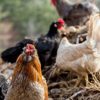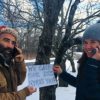Our Hazon Seal of Sustainability network is large and strong. Together, we can aggregate our efforts and demonstrate how we, as a community of Jewish communities, have made and continue to make a measurable difference in safeguarding this earth (being “Shomrei Adamah”)! We applaud each of our Hazon Seal institutions for the unique and impactful programs and policies implemented in 2018. As we begin to consider and to work on projects for 2019, we at the Hazon Seal wanted to announce that we are dedicating 2019 to the area of FOOD POLICY. Whether addressing food waste, hunger in the community, composting and/or animal welfare – we encourage you to consider food policy to be one of your projects for 2019. This means that if you choose to join us in these efforts, we may have funding available for some of your programs! We are happy to announce NEW MINI-GRANTS to help Hazon Seal sites create and implement a FOOD POLICY that also promotes ethical food sourcing and animal welfare in their organization. Get all the details here. Grants are limited and first-come, first-serve, so check it out today! Consider the following… Know a bar or bat mitzvah student who loves […]








